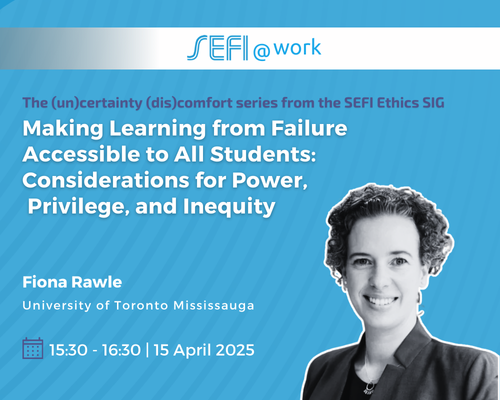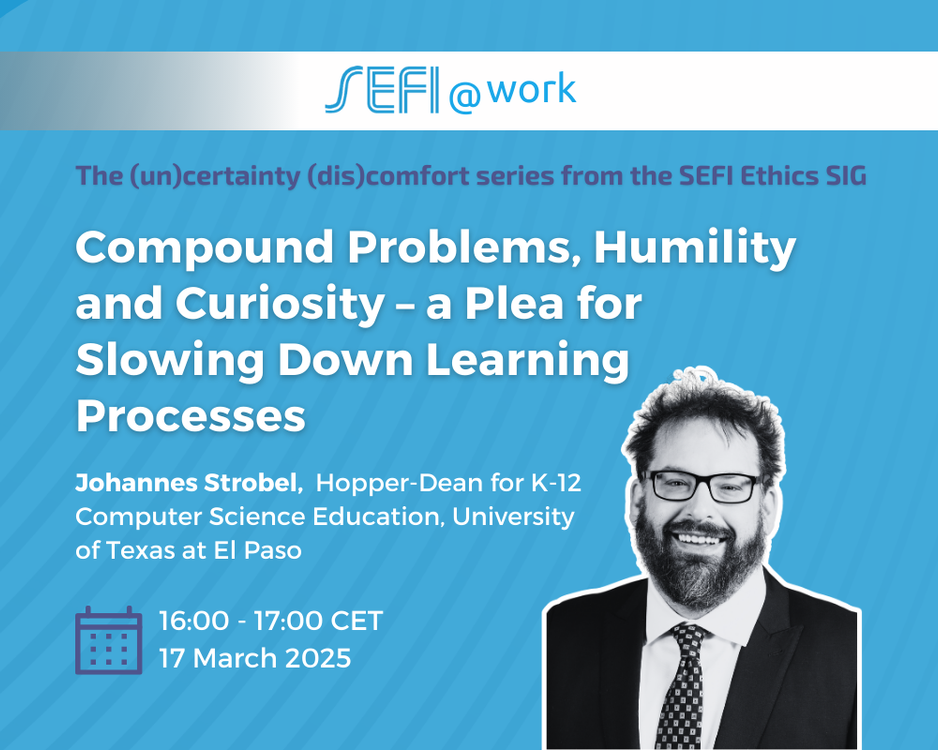15 April 2025, 15:30-16:30 CEST
This webinar will explore the impact that power, and privilege, and inequity play in one’s ability to embrace and learn from failure in the context of higher education.

Donna Riley (Kamyar Haghighi Head of the School of Engineering Education at Purdue University, US)
Across its many disciplines and settings, engineering maintains ethical standards that guide professional practice. Ethics is an essential component of preparation for an engineering career and to that end, accreditation bodies typically include ethics as a required – if underemphasized – aspect of engineering education. In the United States, accreditation has been administered since the 1930s by ABET, an entity comprising some 35 member societies across engineering disciplines. In ABET’s criteria, ethics received only passing mention until a 1990s reform effort produced the so-called “EC 2000” criteria, in which ethics became a stand-alone outcome among several other professional capacities. Graduating engineering students were now expected to have “an understanding of professional and ethical responsibility.”
Recently ABET’s accreditation criteria, which are used to accredit over 750 engineering programs in over two dozen nations, , were changed once again to reduce the total number of student outcomes from 11 to 7, removing much of the language supporting educational breadth for engineers. On the one hand, the ethics outcome is now more prominent, constituting one seventh of listed outcomes. However, the removal or gutting of synergistic outcomes addressing lifelong learning, contemporary issues, and broader social and political contexts may ultimately undermine the goals of engineering ethics education.
What ABET-accredited programs are left with in 2021 is a student outcome requiring “an ability to recognize ethical and professional responsibilities in engineering situations and make informed judgments, which must consider the impact of engineering solutions in global, economic, environmental, and societal contexts.”
This is a compound outcome addressing three distinct abilities: recognizing responsibilities, making judgments, and considering the impact of engineering in multiple contexts. Assessment can be tricky because the outcome potentially conflates ethical competencies with abilities that require separate assessment including global competencies, economic estimation, environmental assessment, and societal level analysis.
I fully support teaching ethics in broad contexts, and instilling all of these competencies in engineers. But as a learning outcome, this item tries to do too much at once, risking emphasis on one aspect at the expense of another. The phrasing around impact of engineering solutions is also problematic, evoking a linear technological determinism in which engineers act in an apolitical, asocial, ahistorical setting, as if problems are pre-defined in a vacuum. But the reality is that engineering projects emerge from and within social contexts that must first be understood if any meaningful attention is to be directed to impacts. Engineering is already global, economic, environmental – and, to use a word that was removed in the criteria revisions – political.
Amid frustration with imperfect outcomes like this one, it may be helpful to remember that accreditation addresses only the bare minimum required for a program to receive recognition as a legitimate milestone in a pathway for licensure; it does not necessarily specify what engineering educators would consider an excellent preparation in engineering ethics. It may also be helpful to remember that while accreditation is often be used as an initial support for engaging ethics education (we have to do it or else!), we ultimately need to find motivations for engineering ethics education beyond compliance. And for accreditation regimes that don’t yet have an emphasis on ethics akin to ABET’s this need to pursue excellent ethics education with independent motivation is all the more important.
What we assess for accreditation and what we teach need not be completely aligned. For example, many of us involved in teaching engineering ethics seek for our students to develop capacities for critical thinking, for empathy, for reflection, or for action. Accreditation does not prohibit this. Ultimately these strategies may prove more effective for developing professionals committed to ethics in their professional careers and personal lives. And with more critical thinkers and reflective actors among our professional ranks, I continue to hope that we will be able, in time, to move our colleagues, our curricula, and accreditation bodies to center ethics at the heart of engineering.


